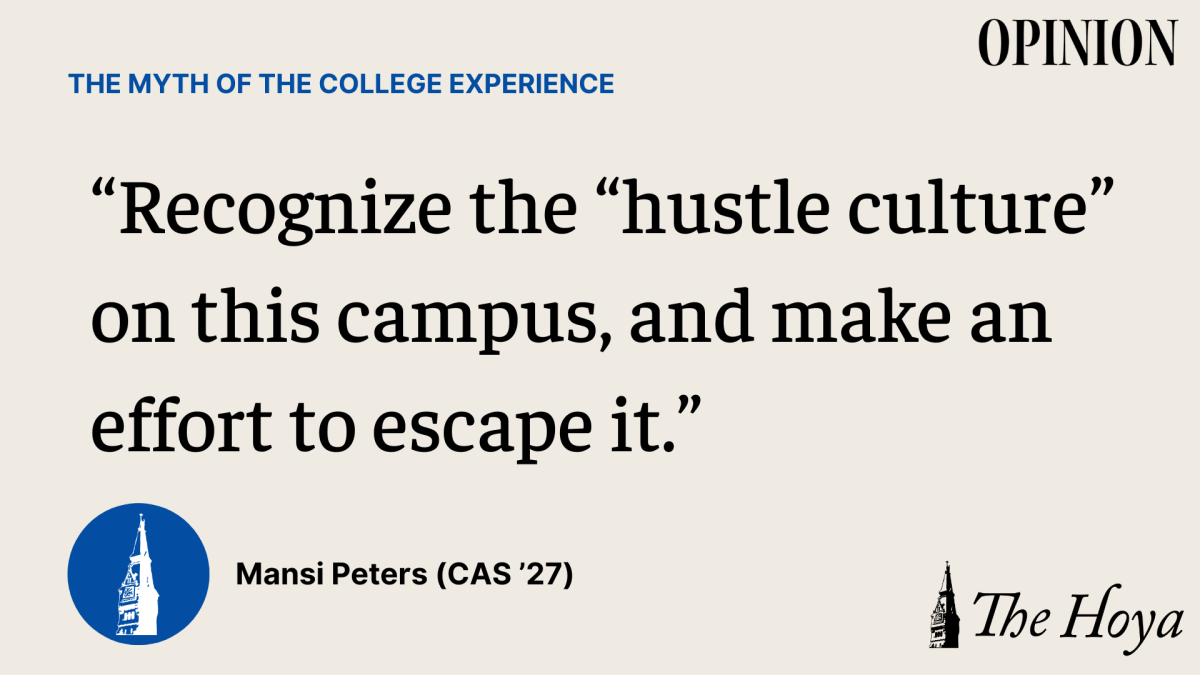
The phrase “I need a break” is a familiar one, especially on campus, where there are few restful moments for students. Even when there is a chance for a break, thoughts of your next assignment or internship application circle your head. It’s true: Georgetown University is known to have a “hustle culture.” But when does the hustle stop?
Social life. We throw the phrase around, expecting it to encompass any part of our lives that exists outside the academic or professional space. As someone who looked to her social life as an escape, I noticed that it wasn’t a break from anything at all. It didn’t feel like I was recharging from the constant pressures of school and work. Even when I had a moment to myself, I was thinking about the people who I hadn’t seen, the coffee dates I needed to schedule and the meals I needed to plan. Truthfully, my packed Google Calendar didn’t reveal that I could balance my stress. Social stress is still stress.
At Georgetown, weekends aren’t all about Greek life, and social events aren’t always rooted in a strong sports culture. As someone whose sister and best friends all attended Big Ten schools known for their party culture, this reality was an adjustment for me. Filling my schedule became trying to compensate for how Georgetown’s social scene differed from the “college experience” I had subconsciously learned to expect.
However, by truly understanding Georgetown, I realized my life wasn’t going to look like how I’d originally pictured it. It was going to be better. Georgetown is not a Big Ten school known for its party culture. Instead, people find where they belong through the various groups and communities they can join. Whether it’s political clubs, activist organizations, student newspaper groups, musical extracurriculars or pre-professional programs, there is something for everyone. The likeness of passions translates into the crowds you run in.
Adjusting to the unique Georgetown social scene, I assumed the “go, go, go” mindset and idealized the packed GCal look. But this mentality took its toll. My body wasn’t thanking me for letting go of academic stress for a few hours just to pick up social stress. My mind wasn’t charging when I forced myself to hang out at a function I didn’t want to go to. I realized that, although I want to go out with my friends, I also want to curl up in my own bed and unplug. It’s okay to go on a three-day bender of being wild and feeling untethered. It’s also okay to eat lunch alone and take a minute for yourself.
When you learn to settle into Georgetown’s culture, don’t take the “hustle” with it. If you are going to categorize your life into academic, professional and social spheres, I encourage you to be cognizant of how you approach them. It’s okay to make intentional time to be with yourself. Go for a walk and listen to your favorite podcast. Read a book (not your assigned readings), journal, reflect on your day or watch your favorite show. Hang out with your friends because you want to, not because you think you have to.
Recognize the “hustle culture” on this campus, and make an effort to escape it. Your social life should not be a part of the hustle. Even hustlers need breaks.
Mansi Peters is a sophomore in the College of Arts & Sciences. This is the first installment of her new column “The Myth of the College Experience.”